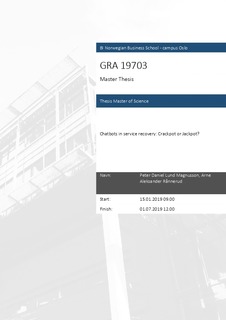Chatbots in service recovery: Crackpot or Jackpot?
Master thesis
Permanent lenke
http://hdl.handle.net/11250/2621405Utgivelsesdato
2019Metadata
Vis full innførselSamlinger
- Master of Science [1621]
Sammendrag
Problem Service recovery has been a heavily researched and studied area for
several years. As technology has continued to develop and been
adapted and incorporated into this field, new research avenues have
also opened up, many of which have not been studied in much depth
as of yet. With very limited research on firms using chatbots as a
service encounter in service recovery, we wanted to investigate this
further. Therefore, we wanted to check if there was any difference
between a customer interacting with a human or a chatbot in a
service recovery situation and measure this with regard to
satisfaction with the firm and recovery.
Purpose The purpose of this study is to analyse the effect of an unsuccessful
and a successful service recovery, provided by either a human,
chatbot or a combination of the two, on satisfaction with the firm
and service recovery.
Research A scenario-based survey experiment was chosen to answer the
Design research problem and questions for this thesis. The design used was
a 3 (Chatbot, Human, Chatbot+Human) x 2 (Unsuccessful,
Successful) between subject design.
Findings Customers are proven to be more satisfied when interacting with
a chatbot in a successful service recovery, than interacting with a
human or a combination of the two. However, when the customers
interact with a chatbot in a unsuccessful recovery, they are even
more unsatisfied than when interacting with a human or the
combination. We also found a significant relationship between the
outcome variable and satisfaction with recovery and firm, and a
significant interaction effect between the outcome and encounter
variables and satisfaction with firm and recovery.
Keywords Service recovery, customer satisfaction, chatbot, human, service
failure, E-commerce, anthropomorphism,
Beskrivelse
Masteroppgave(MSc) in Master of Science in Business, Marketing - Handelshøyskolen BI, 2019
